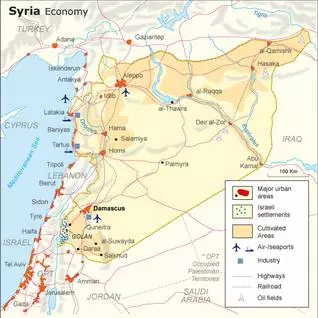
STRATEGIC ASSESSMENT- Damascus. Even as Syrian strongman Bashar al-Assad appears closer to prevailing in the nearly decade-long civil war engulfing Syria, there are new signs of instability amidst a tanking economy, and growing protests. Making matters worse, many now fear that COVID-19 is spreading throughout the country, in what will likely lead to a humanitarian disaster for the country’s already vulnerable population of refugees and internally displaced persons.
The country’s currency, the Syrian lira (or Syrian pound, SYP) has plummeted and the cascading economic anxiety has fueled infighting among Syria’s elite, including wealthy businessmen and even close relatives of Assad himself. Rami Makhlouf, Assad’s billionaire cousin who was previously sanctioned by the U.S. Treasury Department for corruption, broke ranks with the regime and posted a series of videos online vacillating between desperate pleas and veiled threats.
Government salaries have been affected and new protests are erupting in traditional regime strongholds, where those who have been able to maintain some semblance of a normal life throughout the course of the civil war are now at a breaking point. Prices for basic necessities, including food, have risen astronomically.
The economic crisis in neighboring Lebanon has impacted Syrians who kept their money in Lebanese banks and are now unable to access it. As Syrians speak out on social media, posting about growing financial hardships and the government’s mismanagement of the economy, the regime has cracked down on dissent and sought to silence critics through intimidation and arrests. Rather predictably, Assad has resorted to blaming Syria’s economic woes on external agitators, including the United States and Israel.
Compounding Syria’s difficulties will be the expected impact of the so-called Caesar Act, U.S. legislation that includes strict sanctions designed to punish Assad for the litany of human rights abuses perpetrated by the regime. The sanctions are designed to limit the regime’s ability to engage in rebuilding loyalist strongholds, targeting energy, banking, construction, and other vital industries.
Yesterday, the Treasury and State departments, respectively, released 39 designations as part of the Caesar Act and Executive Order 13894, including designations levied against Assad himself, as well as his wife Asma. Numerous other regime cronies have also been designated. And while the sanctions will undoubtedly restrict the ability of Assad’s inner circle to do business, it will inevitably affect long-suffering Syrian civilians in the process.
Nearly four out of five Syrians already live in poverty as a result of the civil war and Assad’s utter destruction of his own country. Syria’s infrastructure has been devastated by the Assad regime’s scorched earth tactics, with the help of Russian and Iranian military forces, as well as multiple overlapping insurgencies waged by a range of violent extremists, including, but not limited to, the Islamic State.
The situation in Syria is approaching a dangerous precipice. Rebel groups are still active throughout parts of the country, including Idlib Province, where al-Qaeda-linked jihadists are interspersed with desperate civilians who have fled other parts of Syria and are now trapped in densely populated pockets throughout the northwest. The close quarters increases the chances of the spread of COVID-19, which will exacerbate an already dire humanitarian challenge.
If the economy approaches all-out collapse, it will threaten the standing of the Assad regime and push Syria further toward catastrophe, resulting in civilian suffering and momentum for battle-hardened terrorists looking to exploit the chaos for their own gain. It seems that the Trump administration is gambling that biting sanctions will force Assad to the negotiating table. But even if that strategy works, Washington is so consumed with its own domestic issues, including its inept response to the coronavirus and demonstrations over police brutality and race relations, that extracting meaningful concessions through a political process is far from guaranteed (TSC).





